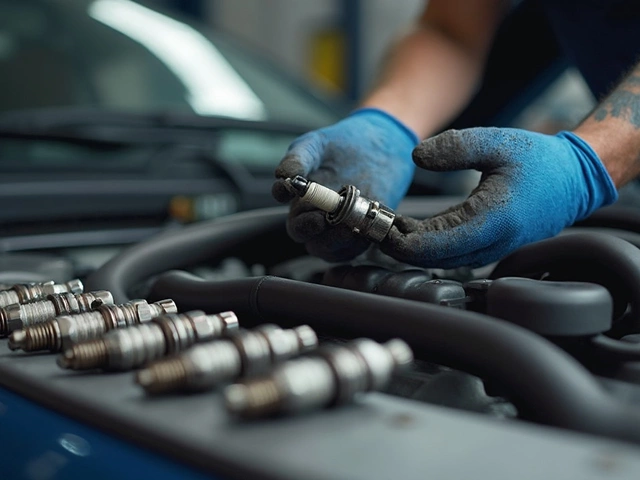Spark plugs might be small, but they play a huge role in keeping your engine running smoothly. When these components start to fail, the symptoms can sometimes be overlooked. Maybe you've been having trouble starting the car in the morning or your vehicle has been using more fuel than usual—these are red flags that all might not be well beneath the hood.
Before you find yourself dealing with more severe engine troubles, it’s crucial to familiarize yourself with the signs of a problematic spark plug. In this exploration, we'll break down the key symptoms and what they might mean for your car’s performance. Regular maintenance and early detection are vital in ensuring your vehicle runs efficiently.
- The Role of Spark Plugs
- Common Signs of Faulty Spark Plugs
- Effects of Ignoring Spark Plug Issues
- Tips for Spark Plug Maintenance
- When to Consult a Professional
The Role of Spark Plugs
Spark plugs are, quite literally, the spark of life for your vehicle's engine. These small devices ignite the fuel and air mixture inside the engine's cylinders, creating the explosions needed to power your car. Without a functioning spark plug, your car won't start, simple as that. Their importance cannot be overstated—they're akin to the heartbeats of the engine. It's no surprise then that a single bad spark plug can lead to a domino effect of engine performance issues, all the way from misfires to inefficient fuel consumption. Since each cylinder has its own spark plug, the impact can vary depending on which one fails first.
The process is a marvel of engineering. When the ignition switches on, electrical energy travels through the ignition system to the spark plug. This electricity needs to leap from the plug, creating a spark that arks across a small gap at the plug's tip. This spark ignites the compressed air-fuel mixture in the combustion chamber, generating the energy needed to thrust pistons and get your car moving. Spark plugs, then, are an essential element of your car's combustion process. But their role extends beyond just starting the engine. They also help maintain optimal power output, ensuring your vehicle runs efficiently. Having fresh, clean spark plugs can even make your car more eco-friendly, reducing emissions.
This is something every car owner should know: "Over time, spark plugs gunk up with carbon deposits, leading to a decline in fuel economy and engine performance," says a renowned auto mechanic from an exclusive interview on engine efficiency.
The composition of a spark plug is designed to withstand extreme conditions within the engine. The electrodes are typically made of durable metals like platinum or iridium that endure thousands of ignitions. However, their life span isn't infinite. The constant high-voltage electrical surges they handle and the intense heat exposure gradually wear them down. This is why routine inspections and potential replacements are advised at mileage intervals specific to each vehicle. Generally, traditional spark plugs last around 30,000 miles, while iridium or platinum options can reach 60,000 to 100,000 miles, depending on manufacturer guidelines.
Since spark plugs are vital to an engine's function, understanding how they work and recognizing when they need attention can be the difference between a smooth ride and unexpected breakdowns. The damage from neglecting spark plug maintenance doesn't stop at the plugs themselves; it can escalate into more severe engine damage, leading to costly repairs. Regular monitoring can also be proactive in identifying other potential mechanical issues, thus serving as an early warning system for care of your vehicle's engine system.
Common Signs of Faulty Spark Plugs
When a spark plug starts to fail, your car could display a range of symptoms that may seem subtle at first but often turn into a significant issue quickly. One of the earliest signs is a noticeable drop in your vehicle’s acceleration. If you put your foot down and feel as if the car isn’t responding as quickly as it used to, a bad spark plug could be to blame. This sluggish response happens because the spark isn't igniting the air/fuel mixture as efficiently as it should, leading to a delay in power delivery.
An engine misfire is another common signal. Misfires can make your engine feel lumpy or cause it to jerk unexpectedly, and you'll probably feel this more at low speeds or when the engine is under load. This issue arises because the spark plug is not combusting the fuel-air mix correctly. The sound and feel of a misfiring engine are unmistakable once you've experienced it. Combining that with a dashboard engine light warning could point to spark plug trouble.
Another symptom is poor fuel economy. If you're finding yourself at the gas station more often, it might be due to a faulty spark plug causing inefficient combustion. This inefficiency means your engine is burning more fuel than necessary to maintain power output, cutting into your wallet each time you fill up. In a typical car, bad spark plugs can decrease fuel efficiency by up to 30%, meaning a considerable increase in fuel costs over time.
If you’re hearing unusual noises from the engine, especially during acceleration or when the car idles, you might want to check the spark plugs. A faulty plug can cause a banging or popping sound, known as backfiring. This happens due to unburned fuel being ignited outside the engine’s cylinders. It’s not just an irritating sound; it can also damage other components in the exhaust system if left unchecked.
Your vehicle's start-up behavior can also give hints. Difficulty starting your engine on a cold morning, or it taking several attempts to get started, should raise suspicions about your spark plugs. Weak sparks won’t ignite the mixture properly, making your car hard to start. This is especially pronounced during cold weather when efficient combustion is crucial. Ignoring this can lead to further damage. According to a study by Car Care Council, issues with spark plugs account for a significant number of hard-start cases annually.
"Routine maintenance on spark plugs is crucial because they affect the engine's overall performance and longevity," notes the Auto Maintenance and Repair Association. It’s not something you’d want to overlook.
In some extreme cases, if you don't remedy the problem, bad spark plugs can cause the engine to stall, and if that happens at highway speeds, it poses a safety risk. To prevent such scenarios, knowing these symptoms can save you a lot of trouble down the road.

Effects of Ignoring Spark Plug Issues
Ignoring problems with your spark plugs can have more serious consequences than one might initially imagine. It's not just about a rough start in the morning or the odd stutter during acceleration; the ripple effects extend deeply into the vehicle's overall health. When spark plugs begin malfunctioning, they send a chain reaction through your car's system. One of the immediate effects you might notice is an intense fuel odor from the exhaust. This is a telltale sign that your combustion process isn't as efficient as it used to be, leading to unburned fuel passing right to the tailpipe.
In many cases, prolonged neglect can lead to the catalytic converter's demise. A catalysis process burdened by incomplete combustion leads to a quicker buildup of residue, ultimately causing blockage. This repair is notoriously expensive, especially when compared to a simple spark plug replacement. Additionally, those consistent misfires can hike up your carbon footprint significantly, as your vehicle emits more pollutants. This makes maintaining spark plugs not only an economic consideration but also an environmental one.
The engine itself doesn't escape unscathed either. Misfiring overstresses engine internal components, causing premature wear. Think of it like jogging in sand; the engine has to work much harder than usual to deliver what should be a straightforward performance. Faulty spark plugs can lead to the engine overheating. The increase in temperature means that parts meant to last years could end up needing early replacement. This is because excess heat affects the integrity of materials, causing warping and other damage over time.
On the other hand, ignoring the symptoms of a bad spark plug can significantly degrade fuel efficiency. You'll find yourself visiting the gas station much more often, with fewer miles covered in between each stop. That extra cost adds up quickly. Additionally, you might experience a drop in acceleration performance. When the spark isn't able to ignite the air-fuel mixture on time or at all, your engine runs sluggishly, resulting in poor throttle response.
"If you notice a decline in engine performance, it's always a good idea to check your spark plugs first," advises Sarah Johnson, a senior mechanic with decades of experience in the field.
In some instances, unresolved spark plug issues can even lead to engine failure. A complete shutdown or a seizure isn't out of the question after extended exposure to faulty components. The financial cost of fixing such substantial damage often far exceeds what would have been necessary had maintenance been carried out promptly. With all these risks at stake, addressing spark plug issues sooner rather than later is not just advisable; it might be essential for the longevity and reliability of your vehicle.
Tips for Spark Plug Maintenance
Maintaining your car’s spark plugs is essential for smooth engine operation and avoiding costly repairs. Many drivers overlook these small yet critical components until they start misbehaving. Spark plugs don’t just ignite the fuel-air mixture; they ensure your vehicle starts and runs reliably every day. Modern vehicles typically need plug replacement every 30,000 to 100,000 miles, depending on the type of plug used and driving conditions. To prolong their life, it's helpful to be proactive with some simple maintenance steps. Begin by routinely inspecting your spark plugs during regular vehicle check-ups. Look for signs of wear or deposits on the plugs; these can indicate specific engine conditions, like running too rich or lean.
To do this, first, make sure your engine is cold to prevent any injuries. Remove one spark plug wire at a time to avoid mixing them up. Use a gapping tool to ensure your spark plugs are correctly gapped; incorrect gaps can cause misfiring or improper combustion. During inspection, pay attention to the insulator nose—the ceramic part of the plug—which should be a light tan. If it’s not, it might suggest an issue with engine temperature or fuel-air mix. Also, make sure the threads and gasket seat are clean to secure a proper fit when reinstalling them. Replacing spark plugs is a delicate job, but with patience and care, it can very well be done in the comfort of your driveway.
While handling this task, it’s crucial to use the right tools. A socket wrench with an extension and a spark plug socket will be necessary. It’s important to note that not every spark plug serves the same purpose, as there are copper, platinum, and iridium plugs each suited for different requirements and lifespans. As a general rule of thumb, iridium plugs last the longest, but it is always best to check the vehicle owner's manual for manufacturer recommendations. Spark plug wires should also be checked for any signs of corrosion or wear, which could compromise engine performance. Modern spark plugs are built to last longer and endure tougher conditions, yet they’re not invincible. Conducting a visual inspection every year and keeping records can be beneficial, especially if your car seems to struggle or frequently visits the mechanic.
Engine performance diagnostics should be on your list of regular checks, especially if you notice increased fuel consumption or sluggish acceleration. Monitoring fuel efficiency can be a clear indicator of a spark plug’s health. Check your fuel consumption after replacing the plugs to measure improvements. A significant drop initially may suggest that the faulty spark plugs were affecting your mileage more than other factors. Keeping a log can help you track changes over time. Let’s remember that even the sound of your engine can tell you a lot. Listen for sounds like rough idling or knocking, which can be symptoms of spark plug issues.
According to Paul Korda, a renowned automotive expert, "Regular spark plug maintenance can extend the life of your engine significantly, saving thousands over the vehicle’s lifespan," reinforcing the vital importance of paying mind to such minor components.
Vehicles often come with different specifications, and what works for one may not work for another. Thus, identifying issues early and making adjustments can prevent performance failures. Whether you're a garage enthusiast or a casual driver, understanding the life expectancy of your vehicle’s parts is essential. Maintaining engine performance isn’t just about maintaining functionality; it’s about enjoying the ride and ensuring your safety on the road. So, keep a schedule, be mindful to clean, and never underestimate the power of a well-maintained set of spark plugs.

When to Consult a Professional
Sometimes, despite our best efforts to maintain our vehicles, certain issues arise that require the expertise of a seasoned mechanic. Deciding when to reach out for professional help can make a significant difference in preventing further damage and potential costly repairs. Recognizing when a spark plug issue is beyond a DIY fix is essential. If you've noticed persistent signs like constant engine misfiring, significant loss in power, or even unusual sounds emanating from the engine, these could be indicators that it's time to get a professional to take a look. These are not issues you want to take lightly, as continuing to drive with faulty spark plugs can exacerbate the problem, not to mention make every drive a frustrating experience.
Spark plug-related performance issues often begin to compound over time, leading to increased fuel consumption and, subsequently, more frequent trips to the gas station. If you observe that the engine runs roughly or has trouble starting, particularly on cool mornings, it might seem like a minor inconvenience at first. However, a compromised spark plug can impact engine performance, and without timely intervention, can lead to more detrimental effects, potentially impacting other components. Once these minor issues become chronic, delaying professional assistance isn't advisable due to the intricacy of modern automobile engines.
According to the National Institute for Automotive Service Excellence, "Neglecting car care almost always means much higher costs down the road in the form of more extensive repairs or lost resale value."
Another key moment to consider consulting a mechanic is during the regular maintenance schedule of your vehicle. Mechanics are trained to spot potential issues that may not be apparent to the untrained eye. They can test the health of your current spark plugs and determine if they're functioning optimally or if it's time for a replacement. Ensuring that these small yet vital components are in good shape can save you stress and expense in the long term. If you've reached or surpassed your car's recommended mileage interval for spark plug replacement but aren't experiencing any immediate issues, it may still be wise to err on the side of caution and have them checked.
How to Choose the Right Professional
Finding the right mechanic or repair service is crucial. Look for professionals who specialize in car maintenance and repair, specifically those who have experience with the make and model of your vehicle. It's always a good strategy to ask for recommendations from friends or family, read online reviews, and even visit the shop in person to get a feel of their experience and customer service quality. Transparency about their diagnostic process, as well as pricing, should be non-negotiable.
| Condition | Professional Consultation Necessity |
|---|---|
| Persistent Engine Misfire | Urgent |
| Significant Power Loss | Recommended |
| Decrease in Fuel Efficiency | Evaluate |
Ultimately, consulting a professional when you suspect there may be trouble with your car’s spark plugs is a wise move. It's a step that safeguards your vehicle's performance and ensures a smooth ride ahead. By being proactive, you can maintain the health of your car's engine and extend its life significantly. After all, as anyone who has faced unexpected vehicle problems knows, prevention always beats cure.






